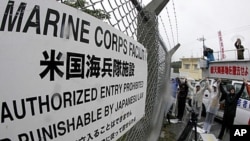Japanese and U.S. officials are discussing a possible compromise on a long-stalled plan to move thousands of American Marines off the southern Japanese island of Okinawa. The transfer is considered a critical part of a realignment of U.S. forces in the Pacific region at a time when China is increasing its military strength.
Japanese officials say Washington and Tokyo are looking to separate the issue of Okinawa base closures from the transfer of Marines off the island.
The matter has been under review by officials in both countries for years, without a resolution, and it is hoped that separating the issues will break the impasse.
Japanese Prime Minister Yoshihiko Noda, speaking in parliament Tuesday, called it premature to discuss specifics of a new deal, explaining that his government wants to resolve the issue as quickly as possible and be flexible about solutions.
According to Japanese officials, solutions under discussion include moving fewer than 5,000 Marines -- well below the 8,000 originally planned -- from the Futenma base on Okinawa to the island of Guam, a U.S. territory in the Pacific. Japanese political leaders say other Marines would go to an existing Marine Corps air station at Iwakuni on the mainland, as well as to other places in the Asia-Pacific region, on a rotational basis.
In Seoul, government officials denied media reports that some of Marines would see temporary assignments in South Korea, which presently hosts more than 28,000 U.S. military personnel.
Pentagon spokesman George Little said he cannot confirm any new agreements out of the latest round of talks, which began Monday, with visiting Japanese officials at the State Department.
"We’ve been meeting for years now with our Japanese counterparts to discuss the Futenma relocation plan and the potential move to Guam," said Little. "The bottom line is that we remain committed to the road map and we’re continuing to have discussions with the Japanese."
Longstanding tensions
The presence of the Marines on Okinawa is unpopular with many islanders.
The air station at Futenma is surrounded by a congested urban area. The United States and Japan agreed in 1996 that the facility would be shut down. But plans to build a replacement base for the Marines in a less congested coastal area of Okinawa have met strong resistance from environmentalists and other groups.
But now word of a possible compromise that would de-link personnel transfers from the base closure is creating new controversy. Anti-base groups on Okinawa, which shoulders the majority of the U.S. military presence in Japan, worry that separating the issues will mean further delays in closing Futenma.
In Iwakuni, Mayor Yoshihiko Fukuda says people in his community will be reluctant to host more Marines. Plans are already in progress to transfer fighter jets used on U.S. aircraft carriers to the air station there.
"Although Iwakuni desires to resolve the issue," said the mayor via interpreter, "the city's stance is not to take on additional burdens related to military activities.
Sekinari Nii, governor of Yamaguchi Prefecture, where Iwakuni is located, also expressed opposition, saying that if the central government pushes the relocation, he may retract a December pledge to approve sales of land for U.S. military family housing.
Japanese and American officials are hoping to have agreement on a revised overall plan in time for Prime Minister Noda's visit to Washington, which is expected to occur in the next few months.
Strategy to Break Okinawa Impasse Sparks Controversy
- By Steve Herman













